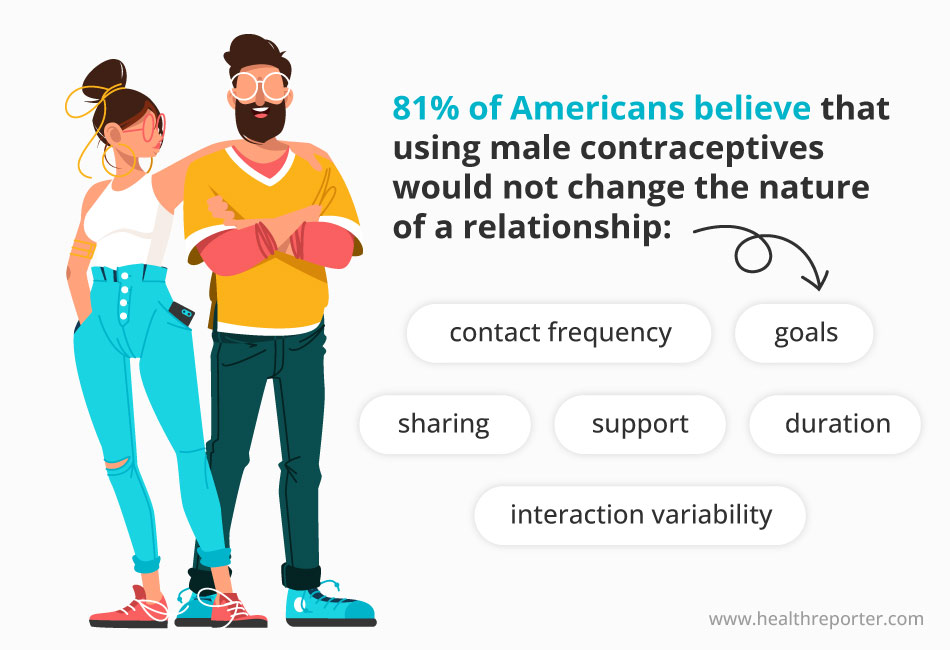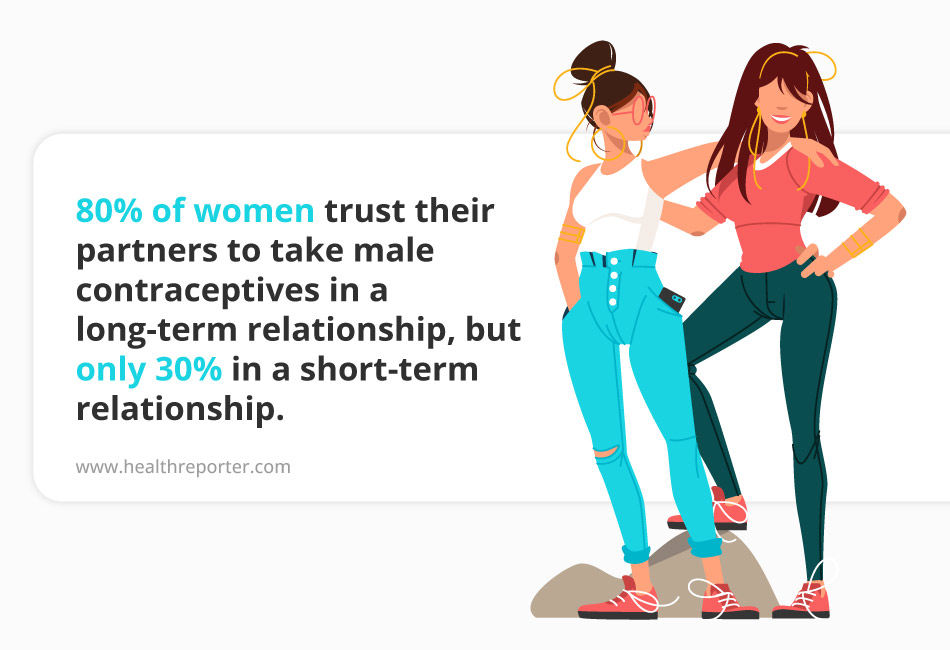How Male Contraception Pills Will Revolutionize Sex, Relationships, and Society
Male contraception pills have transformative potential on sexual health, relationships, and society in general. Backed by research, statistical data, and expert insights, this analysis offers a glimpse into the future of reproductive health and gender equity.

Global studies reveal that almost half the pregnancies are unplanned.1
One of the reasons is that women are usually solely responsible for contraception. With the availability of long-acting male contraceptives, the rate of unplanned pregnancies will decrease significantly.2
On Valentine’s Day, evoking feelings of romance and hope, we got exciting news. A new study revealed pills that temporarily halt the movement of sperm and could be “game-changers” for male contraception.3
We could soon see more men stepping up to share the birth control burden, which has historically fallen on women’s shoulders. Yet, the question remains: will men actually take those pills?
Moreover, the arrival of male contraception can transform how we approach sex and relationships. Who knows, maybe it will even make Tinder dates less terrifying? We are not making any promises but are excited to discuss what the future holds.
To gain a comprehensive understanding of male contraception pills and their impact, Health Reporter conducted extensive research, consulted statistical data, and sought out expert opinions.
What Is This Male Contraception Drug Everyone Is Talking About
To date, male contraceptive methods have been limited to condoms and surgical sterilization by vasectomy.

Efforts to develop male contraceptives in pill form have been hampered by poor efficacy, slow action, or side effects.4 There has even been a lot of eye-rolling on the internet because women have been experiencing similar effects for decades.
Developing contraceptives for men is more challenging than creating similar products for women. The former has to stop the daily flow of millions of sperm, while the latter only needs to block one or two eggs from leaving the ovary once every 28 days.
Yet, US scientists found the substance TDI-11861. It paralyzes spermatozoa and prevents their maturation without disturbing sexual function.

Men can take this contraceptive just before sexual activity, and their fertility will be restored the next day. After six weeks of continuous use, no side effects were observed.
The new substance holds great promise but has yet to be tested on humans. In animal testing, the contraceptive was 100% effective during the first two hours and 91% during the first three hours.
How Male Contraception Will Reshape the Nature of Sex and Relationships
Speaking about sex and male birth control pills, the first thing that comes to mind is a possible decrease in libido. After all, birth control pills for women often have this side effect.
However, female pills are hormonal. Hormone receptors regulate when the brain releases mood-related neurotransmitters, including libido. A medication with hormonal contraceptives can interfere with this process.
The male contraceptive pill does not contain hormones. For now, no medical evidence indicates that the drug will affect sexual desire or ability.
Speaking of a relationship, creating a male contraceptive pill will alleviate the burden of contraception on women.
Men will get more control over their reproductive decisions. However, it could transfer the responsibility for contraception solely onto men and lead to unforeseen outcomes.
In the US, most Americans (81%) believe that using male contraceptives would not change the nature of a relationship and will enhance intimacy.5

Men and women are motivated to use male contraceptives by the possibility of having more sex with their partners. Most people would be less likely to use condoms if male contraceptives were available.6
“In countries with high rates of unintended pregnancy, male contraceptives will reduce the number of unplanned pregnancies and the need for abortions. This would be especially beneficial for young people who may not have access to other contraception,” – says Gregory Quayle, an ABMS-certified urologist from Mississippi.
Will Men Actually Use Contraception Pills? A Societal Analysis
One of the reasons men may be hesitant to take birth control pills is due to societal stereotypes and stigmas surrounding masculinity.
In many cultures, masculinity is closely linked with fertility, and some men may perceive a loss of “male power” when unable to father children.
This creates a stigma around male contraceptive use, making it harder for men to discuss and consider their options openly.
- According to the Ipsos study, the majority of heterosexual Americans (89%) do not think that men who take male contraceptives are less manly.7
- However, a quarter of men worry that women would think less of them as men. In turn, 10% of women believe taking male contraceptives would make a man seem less masculine.
Another stigma is that men are expected to be the primary decision-makers and breadwinners in relationships. As a result, they may feel more pressure to take on responsibility for birth control.
American men are 9 times more likely than women to think it’s mostly the man’s job to use birth control. Only 1% of women believe this, compared to 9% of men.
In some societies, sex education focuses primarily on female contraception, such as birth control pills or intrauterine devices (IUDs). This can lead men to believe they are not expected or required to take an active role in preventing pregnancy.
- In the US, more than half of men are willing to use male contraceptives in both short and long-term relationships (65% and 57%).
- At the same time, 8 in 10 women (80%) trust their long-term partners to take them, but not as much in short-term relationships (only 30%).

It is normal that men experience fear of the components of the pills, as well as fears for physical and mental health, sexual desire, libido, genital health, and fertility.
Therefore, whether men will actually use these pills depends on the availability of safety studies, as well as the education and mindset of the men themselves.
“It is important to note that contraception is a personal choice and should not be forced upon anyone. Both partners need to have an open and honest conversation about contraception and sexual health,” – says Alex Polyakov, gynecologist and associate professor at the University of Melbourne.
Conclusion
To share the responsibility of contraception more equally between men and women, we need more than just revolutionary pills.
We must constantly address sex and gender questions. For example, create more contraceptive programs that involve men and promote gender-equitable attitudes. This can be done through peer outreach and mass media initiatives.
Science is driving progress and providing more opportunities for healthy relationships, safe sex, and gender equality. Yet, achieving these goals requires us to take responsibility for ourselves.
When both men and women take control of their reproductive health, it will lead to equitable and fulfilling relationships and, ultimately, a healthier society.
Sources
- Global, regional, and subregional trends in unintended pregnancy and its outcomes from 1990 to 2014: estimates from a Bayesian hierarchical model
https://www.ncbi.nlm.nih.gov/pmc/articles/PMC6055480/ - Modeling the impact of novel male contraceptive methods on reductions in unintended pregnancies in Nigeria, South Africa, and the United States:
https://www.contraceptionjournal.org/article/S0010-7824(17)30430-4/fulltext/ - On-demand male contraception via acute inhibition of soluble adenylyl cyclase:
https://www.nature.com/articles/s41467-023-36119-6/ - Male Birth Control Study Killed After Men Report Side Effects:
https://www.npr.org/sections/health-shots/2016/11/03/500549503/male-birth-control-study-killed-after-men-complain-about-side-effects/ - Majority of Men Say They Would Be Likely to Take Hormone Pill or Injection as a Means of Birth Control, Regardless of Their Relationship Status:
https://www.ipsos.com/en-us/majority-men-say-they-would-be-likely-take-hormone-pill-or-injection-means-birth-control-regardless/ - Majority of Men Say They Would Be Likely to Take Hormone Pill or Injection as a Means of Birth Control, Regardless of Their Relationship Status:
https://www.ipsos.com/en-us/majority-men-say-they-would-be-likely-take-hormone-pill-or-injection-means-birth-control-regardless/ - Majority of Men Say They Would Be Likely to Take Hormone Pill or Injection as a Means of Birth Control, Regardless of Their Relationship Status:
https://www.ipsos.com/en-us/majority-men-say-they-would-be-likely-take-hormone-pill-or-injection-means-birth-control-regardless/

















































 Select your language:
Select your language: 








